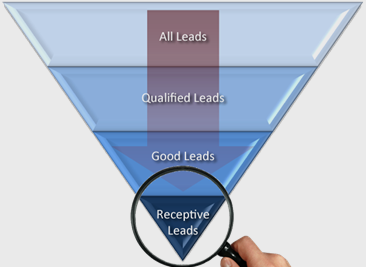Appointment Setting for Lead Generation
Making Working From Home Fun
March 22, 2014Follow up on Trade Show Leads for Maximizing ROI
March 27, 2014Lead generation is the very first step in the B2B sales process. Without a lead, who do you sell to? Because of this need, lead generation has, in a relatively short period of time, grown to become a big business. Be it online or offline, there’s today a proliferation of lead generation service providers offering a range of services aimed at serving the B2B market.
The harsh reality though, is that not every lead is the same. For instance, for a company selling office equipment, would a form fill on a lead generation website be of the same value as a confirmed appointment with the purchase decision maker having the budgets and actively looking for a vendor of office equipment? Would a lead of a prospective customer with 5 employees be the same as that of a corporation with hundreds of employees? There are so many aspects that separate a lead from a qualified lead that any meaningful lead generation effort calls for a structured and systematic process and approach to identifying the best leads for your business. To do this, we follow what we call the inverted pyramid of leads.
The Inverted pyramid of leads
 The inverted pyramid of leads is a simple filtering of leads by quality to be able to isolate and focus on the best leads that are most likely to result in a sale for the business. This pyramid includes:
The inverted pyramid of leads is a simple filtering of leads by quality to be able to isolate and focus on the best leads that are most likely to result in a sale for the business. This pyramid includes:
- All leads that a business gets
- This gets filtered down to qualified leads
- Out of the qualified leads, the pyramid isolates the good leads
- And finally, from among the good leads, the focus narrows down to the most receptive leads that are most likely to result in a sale.
Let us explain how this filtering works.
Filtering the pyramid down to the most receptive leads
Before lead generation can even begin, there needs to be considerable research. This includes finding all the possible businesses in a region, classifying them by the nature of their business, scale of operation, contact information. The better the database is segmented, the better is the chance of landing a good lead. From this universe of potential leads emerges the inverted pyramid of leads. This is how we work the pyramid to find the best and most receptive leads:
All Leads: This is simply every business that may be interested in the product or service you have to sell. This is the broadest grouping of the potential and focusing here can result in a lot of time and effort wasted chasing leads that have very little or no chance of resulting in a sale.
Qualified Leads: For a lead to be considered a qualified lead, it needs to qualify on factors of demographics and more. For instance, if the product is aimed at women of a certain age, there is no point getting leads to men or women who do not fall into that age group. Similarly, location, business turnover, purchase history, relevance to your business, all play a role in determining whether a or not a contact in the database may be considered a lead.
Good Leads: A qualified lead can be useless unless you are able to connect with the decision maker in the business. Even if you managed to reach the end user, unless the purchase decision maker holding the budget strings is convinced, the lead may not result in a sale.
Receptive Leads: Imagine a good lead coming from a form filled on a lead gen website. The person may have filled such forms on many other sites too that sent the lead to your competitors. The person could have forgotten about it or may not actually be in a receptive frame of mind when your sales executive contacts the lead. All of these contingencies can result in a lead not turning into a sale. So how do you ensure that the lead is receptive to your contact? There really is no way to guarantee a person’s mood on a given day, but a good appointment setting service can improve the odds dramatically.
Appointment Setting for B2B Lead Generation
 Appointment setting services give your sales team more than a lead. They give them a foot in the door. Your sales team is armed with information on the lead and actually have a confirmed appointment. There are all kinds of appointment setting services, and not all will be able to deliver a receptive lead consistently. Let’s face it, no one likes to receive calls for sales or appointments. It gets even worse when you get calls from the human-robots that stick to a script and stumble their way around.
Appointment setting services give your sales team more than a lead. They give them a foot in the door. Your sales team is armed with information on the lead and actually have a confirmed appointment. There are all kinds of appointment setting services, and not all will be able to deliver a receptive lead consistently. Let’s face it, no one likes to receive calls for sales or appointments. It gets even worse when you get calls from the human-robots that stick to a script and stumble their way around.
Appointment setters are often the very first point of contact the prospective lead has with your business. At HMS, we recognize that there is never a second chance to create a good first impression. In order to consistently deliver receptive leads to our clients’ sales teams, we value the following seven attributes that contribute towards a receptive lead and invest in ensuring that our appointment setters are:
- Confident: An appointment setter who lacks confidence or mumbles on the call can actually hurt the image of your business. Leaving the prospect irritated is not what your business wants and as the first point of contact, an appointment setter’s confidence plays a key role.
- Capable of improvising: Have you ever encountered callers who are stuck to their script and sound almost robotic in their responses? How many of these leave a good impression? The ability to improvise and address the needs of the person on the call is crucial to good appointment setting.
- Capable of disarming resistance: More often than not, there’s a resistance to a call that solicits a sales appointment. The ability of the appointment setter in disarming this resistance directly impacts success rate and the number of appointments that the appointment setter can set up for your sales team.
- Capable of reaching the decision maker: Not all appointment setters are able to reach decision makers. If the appointment is not with the decision maker, your sales team needs to do extra work. Often, it can lead to a dead end and not result in a sale.
- Arming the sales team: A good appointment setter doesn’t stop at getting an appointment. The notes he or she takes on a call, the insights about the business, the need, the decision maker, etc., that the appointment setter takes, can arm your sales team with valuable information that they can use to convert the lead into a sale.
- Creating receptivity: Even when an appointment setter reaches the decision maker, and provides useful information to the sales team, how the sales team is received at the appointment can make or break the deal. Receptivity is influenced by a number of factors like: the impression that’s left with the decision maker about your business, recall, what s/he remembers from the call and how your sales team is received at the appointment. The ability to create this receptivity can bring down walls and pave the way for your sales team. Appointment setters who can consistently deliver receptive leads strengthen your sales team and deliver far more value than just a lead.
At HMS we do not just focus on appointments for our clients. We focus on delivering receptive leads time and again. We work as an extension of your sales team, adding value to your sales process through a team of highly trained appointment setters. Contact us for your lead generation and appointment setting needs. Let us partner for success!
